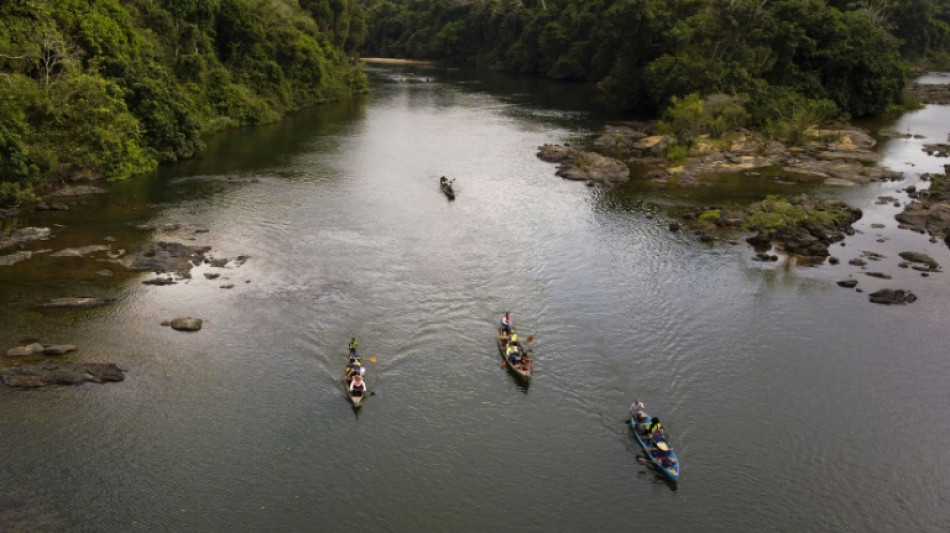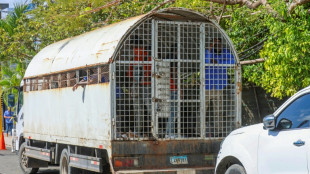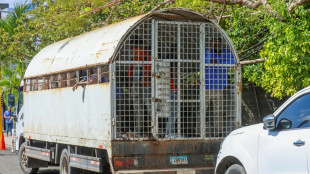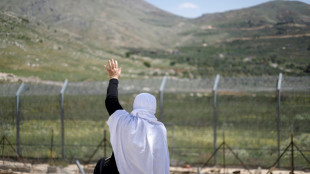
-
 Trump orders curb on virus research he blames for Covid pandemic
Trump orders curb on virus research he blames for Covid pandemic
-
'Makes no sense': Hollywood shocked by Trump's film tariffs announcement

-
 First day of jury selection wraps in Sean Combs sex crimes trial
First day of jury selection wraps in Sean Combs sex crimes trial
-
Dominican Republic reports sharp rise in Haitian migrant deportations

-
 Mennonite communities raise hackles in Peruvian Amazon
Mennonite communities raise hackles in Peruvian Amazon
-
Dominican Republican reports sharp rise in Haitian migrant deportations

-
 Stars shine at Met Gala, showcasing Black dandyism
Stars shine at Met Gala, showcasing Black dandyism
-
Ireland captain Doris doubtful for Lions tour due to shoulder injury

-
 Pentagon chief orders 20% cut in number of top officers
Pentagon chief orders 20% cut in number of top officers
-
'New superstar' Zhao's world title heralds Chinese snooker revolution

-
 OpenAI abandons plan to become for-profit company
OpenAI abandons plan to become for-profit company
-
Ford sees $1.5 bn tariff hit this year, suspends 2025 forecast

-
 Snooker star Zhao: from ban to Chinese sporting history
Snooker star Zhao: from ban to Chinese sporting history
-
Zhao makes history as China's first World Snooker champion

-
 Brazilian ritual root gets second life as potential anti-depressant
Brazilian ritual root gets second life as potential anti-depressant
-
Israel says 'most' Gazans to be displaced in expanded operation

-
 Israel strikes Yemen after Huthi attack on Ben Gurion airport
Israel strikes Yemen after Huthi attack on Ben Gurion airport
-
'It's time': Popovich passes Spurs torch to Johnson

-
 Cummins heroics in vain as rain forces Hyderabad out of IPL playoff race
Cummins heroics in vain as rain forces Hyderabad out of IPL playoff race
-
Huthis say US, Israel bomb Yemen after strike on Israeli airport

-
 Lewandowski on bench for Barca's showdown with Inter, says coach Flick
Lewandowski on bench for Barca's showdown with Inter, says coach Flick
-
Pricing birdsong: EU mulls nature credits to help biodiversity

-
 Scholz vows continued German support in last call with Zelensky
Scholz vows continued German support in last call with Zelensky
-
UK kicks off party to mark 80 years since end of WWII

-
 Global film industry reels from Trump tariff announcement
Global film industry reels from Trump tariff announcement
-
Cardinals assemble to elect pope and set course for church

-
 Meta content moderator cuts over 2,000 jobs in Spain: union
Meta content moderator cuts over 2,000 jobs in Spain: union
-
Pakistan conducts second missile test, India readies civil defence drills

-
 Pro-EU or pro-Trump? Romania faces decisive choice in vote
Pro-EU or pro-Trump? Romania faces decisive choice in vote
-
Nazi surrender site sets the scene for Wim Wenders short film

-
 French court backs Olympics choreographer in cyberbullying case
French court backs Olympics choreographer in cyberbullying case
-
Romania run-off pits pro-Trump nationalist against centrist mayor

-
 South Africa's Rabada back in IPL after serving drug ban
South Africa's Rabada back in IPL after serving drug ban
-
Pride and excitement as UK crowds celebrate 80 years since WWII's end

-
 Ex-French interior minister Darmanin apologises for 2022 Champions League fiasco
Ex-French interior minister Darmanin apologises for 2022 Champions League fiasco
-
Zhao on brink of becoming China's first World Snooker champion

-
 Stars come out for Met Gala, showcasing Black dandyism
Stars come out for Met Gala, showcasing Black dandyism
-
Jury selection begins in Sean 'Diddy' Combs sex crimes trial

-
 Martinez rushing to be ready for Barca showdown, says Inter's Inzaghi
Martinez rushing to be ready for Barca showdown, says Inter's Inzaghi
-
Warren Buffett to remain as Berkshire Hathaway board chair

-
 UK royals lead celebrations to mark 80 years since WWII end
UK royals lead celebrations to mark 80 years since WWII end
-
Top Spanish court drops tax complaint against ex-king Juan Carlos

-
 Who are the Middle East's Druze religious community?
Who are the Middle East's Druze religious community?
-
Russian reporter critical of Ukraine war escapes to France

-
 France names first Concorde jet a historical monument
France names first Concorde jet a historical monument
-
France, EU take aim at Trump's assault on science, seek to lure US researchers

-
 Catholic Church's direction in the balance as vote conclave looms
Catholic Church's direction in the balance as vote conclave looms
-
German coalition deal signed on eve of Merz govt launch

-
 UK begins four days of events to honour last WWII veterans
UK begins four days of events to honour last WWII veterans
-
Cassocks competition: whose outfit will new pope wear?


'Progress destroying nature': Brazil dam fuels fears for river
Holding a dead fish, Junior Pereira looks grimly at a puddle that used to be part of Brazil's Xingu river, a mighty Amazon tributary that has been desiccated here by the massive Belo Monte hydroelectric dam.
Pereira, a member of the Pupekuri Indigenous group, chokes up talking about the impact of Belo Monte, the world's fourth-biggest hydroelectric complex, which locals say is killing one of the most biodiverse regions on Earth and forcing them to abandon their way of life.
"Our culture is fishing, it's the river. We've always lived on what the river provides," says Pereira, 39, who looks like a man trapped between two worlds, wearing a traditional Indigenous necklace and a red baseball cap.
He gazes at the once-flooded landscape, which Belo Monte's water diversion has made a patchwork of puddles dotted with stranded fish.
"We've lost our river," he says.
"Now we have to buy food in the city."
- 'Like a permanent drought' -
Stretching nearly 2,000 kilometers (1,250 miles), the Xingu ebbs and flows with the rainy season, creating vast "igapos," or flooded forests, that are crucial to huge numbers of species.
They are also crucial to an estimated 25,000 Indigenous people and others who live along the river.
Belo Monte diverts a 100-kilometer stretch of the Xingu's "Volta Grande," or Big Bend, in the northern county of Altamira to power a hydroelectric dam with a capacity of 11,233 megawatts -- 6.2 percent of the total electricity capacity of Latin America's biggest economy.
Built for an estimated 40 billion reais ($7.5 billion) and inaugurated in 2016, the dam diverts up to 80 percent of the river's water, which scientists, environmentalists and residents say is disastrous for this unique ecosystem.
"The dam broke the river's flood pulse. Upstream, it's like it's always flooded. Downstream, it's like a permanent drought," says Andre Oliveira Sawakuchi, a geoscientist at the University of Sao Paulo.
That is devastating fish and turtle populations whose feeding and reproduction cycles depend on the igapos, he says.
Sitting by the Xingu's breathtaking Jericoa waterfalls, which the Juruna people consider sacred, Indigenous leader Giliarde Juruna describes the situation as a clash of worldviews.
"Progress for us is having the forest, the animals, the rivers the way God made them. The progress white people believe in is totally different," says Juruna, 40.
"They think they're doing good with this project, but they're destroying nature and hurting people, including themselves."
- Lula under scrutiny -
Proposed in the 1970s, Belo Monte was authorized under ex-president Luiz Inacio Lula da Silva (2003-2010) -- who just won a new term in Brazil's October elections.
As Lula, 77, prepares to take office again on January 1, the project is drawing fresh scrutiny from those hoping the veteran leftist will fulfill his promise to do a better job protecting the Amazon than outgoing President Jair Bolsonaro, who presided over a surge in deforestation.
Touted as a clean-energy source and engine of economic development, Belo Monte has not exactly lived up to expectations.
According to the company that operates it, Norte Energia, the dam's average output this year has been 4,212 megawatts -- less than half its capacity.
A recent study meanwhile found its operations tripled the region's greenhouse gas emissions -- mainly methane released by decomposing forest that was killed by the flooding of the dam reservoir.
- A new plan -
In 2015, researchers from the Socio-Environmental Institute (ISA) conservation group teamed up with the Juruna to document the devastation.
They have devised a new, less-disruptive way for Belo Monte to manage water, the "Piracema" plan -- named for the period when fish swim upriver to spawn.
Researchers say the plan is a relatively small tweak to the dam's current water usage, adapting it to the natural flood cycles.
Brazil's environmental regulator is due to rule soon whether to order Norte Energia to adopt it.
The company declined to comment on the proposal, saying in a statement to AFP that it instead "recognizes the plan established in the plant's environmental licensing."
The decision is vital, says biologist Camila Ribas of the federal government's National Institute for Amazon Research.
"These are incredibly intricate, interlinked systems. If Belo Monte and other hydroelectric projects disrupt them too much, it could spell the end of the Amazon."
F.Schneider--AMWN
